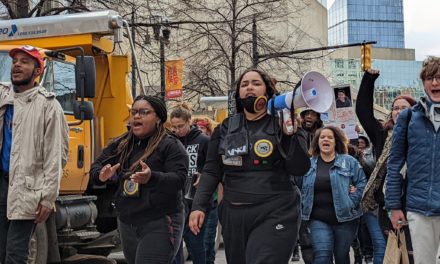Secrecy has swept through the Michigan Independent Citizens Redistricting Commission after a majority of its members voted to keep notes from a closed meeting secret from the public. The Commission already faces pending litigation from various media organizations for not releasing the meeting documents, and could potentially face other litigation over the new redistricting maps as the clock ticks toward a deadline. At the end of December, the commission is expected to adopt new legislative and congressional districts for the state.
One Detroit Associate Producer Will Glover gets to the bottom of the situation with Bridge Michigan reporter Sergio Martínez-Beltrán to hear about what’s happened so far and what to expect from the commission next.
RELATED: Lawmakers, News Outlets Blast Ongoing Secrecy of Michigan Redistricting Panel
Full Transcript:
Will Glover: Just give us a quick overview of what the redistricting process is and how important it is to the state of Michigan.
Sergio Martínez-Beltrán, Reporter, Bridge Magazine: Every 10 years, the U.S. Census Bureau releases the population counts of states. And so the states use those numbers to do apportionment so to create new political boundaries. And that means that those are the districts where you live and they decide, who are you going to vote for in terms of state Senate, State House also, who could be your congressional member. Right. Depending on where you live.
Sergio Martínez-Beltrán: And you know, when you give power to people who might benefit from it, this tends to be problematic, right? And we’ve we saw that the Legislature drew lines in private, in secret, behind closed doors. And it also drew districts that were deemed some of the most gerrymandered in the country.
Sergio Martínez-Beltrán: In 2018, the Michigan voters overwhelmingly supported a constitutional amendment that drastically changed how we drew districts in the state. So that constitutional amendment created the Michigan Independent Citizen’s Redistricting Commission. That’s a group made up of 13 everyday people, four Republicans, four Democrats and five independents who have never joined districts before.
Sergio Martínez-Beltrán: They have never had to work with maps in the past, but they were they volunteered themselves. They were elected or selected, I should say, and they are the ones showing the lines this year.
Will Glover: I know that there is a 45-day window where the public gets to make comments. They’ve released some of their drafts for the masses. Is that where we are?
Sergio Martínez-Beltrán: That’s right, yes. So for the last few months, the redistricting commission has been working on proposed maps. And so a few weeks ago, they put forward 15 proposed maps for people to see and provide feedback on them. We are in that 45 day public comment period. We’re in the middle of it.
Will Glover: Lately, we’ve seen that there have been a few media outlets that have filed suit against the Commission for keeping certain memorandum secrets. Can you just tell us a little bit about what’s going on there?
Sergio Martínez-Beltrán: Yeah. So I think the biggest issue that the commission is facing is how it has handled minority-majority districts in the state. In the past, Michigan has had 17 state legislative minority-majority districts, most of them in the area of Detroit, but also some in Flint. The way the redistricting commission has drawn the districts this time around truly reduces significantly the number of minority-majority districts to a handful, right?
Sergio Martínez-Beltrán: And so black leaders, black voters in southeast Michigan, in Flint, Michigan, as well. They have come out and said that the way the commission drew these districts will further disenfranchise them. We’re talking now in terms of lawsuits, right? And this is when where the press comes in. The commission has been significantly more transparent, done the previous process right at the Legislature.
Sergio Martínez-Beltrán: But just because they have been more transparent doesn’t mean we’re not going to hold them accountable. And what we know is that on October 27th in East Lansing, the commission met behind closed doors. They shut out the public, they shut out the press and they discussed two private memos two memos, one of them that had to do with the Voting Rights Act, which is the federal law that allows for the creation of minority-majority districts, and also another memo that was about the history of discrimination in the state and its impact on voting.
Speaker 1: We have since had a letter signed by all of our council setting forth reasons that we should not release the memo, which is really a historical document or the tape of the conversation. There was quite a bit historical comment in the paper that showed how Michigan had dealt with historically discriminatory voting in the past from the Civil War forward.
Speaker 2: If the commission decides to waive attorney-client privilege, our ability to give you counsel in incoming litigation will be hampered. And that is an understatement.
Will Glover: So I guess the question lies in whether or not it’s more important for the lawyers that the committee has on retainer to be able to give them the correct candidate information vs. abiding by what the whole purpose of the commission is, which is to be transparent in everything, all of the materials that it uses to draw these lines, correct?
Sergio Martínez-Beltrán: Yes, that’s that’s a big question. And I think that, you know, when the commission was discussing these memos behind closed doors, the reality is that there was no pending litigation against the commission at that moment. So this idea of discussing legal strategy when there’s no pending litigation against the commission has raised some concerns, and some attorneys have said that that’s weird. And that’s not what usually happens, right?
Sergio Martínez-Beltrán: We also know that the commission spokesman, but also the commissioners, keep saying that they are the most transparent body in the state. But then when you push them on this, on this particular issue very quickly, they quickly get a little bit upset because they say that they have the right to keep these documents private or secret because they follow their attorney-client privilege.
Sergio Martínez-Beltrán: And so this is why it matters. It is because voters in Michigan 61% of the voters in Michigan in 2018 voted to create a commission and a process that was A, more fair in terms of partizanship, but also more transparent. And I think the commission, right, has faced all these questions all this time.
Sergio Martínez-Beltrán: But I think it’s important because at the end of the day, we’re talking about people of color and they’re feeling that the way the commission has treated districts are further disenfranchising them, especially black voters in Detroit. And what we’re talking about here is that the commission keeps saying, we’re not, we’re not hurting you, but they’re using some documents that we don’t know.
Sergio Martínez-Beltrán: And maybe if they make those documents public, we would know what was the rationale for them to reducing the minority-majority districts and the reason for the way they treated the political boundaries.
Subscribe to One Detroit’s YouTube Channel & Don’t miss One Detroit Mondays and Thursdays at 7:30 p.m. on Detroit Public TV, WTVS-Channel 56.
Catch the daily conversations on our website, Facebook, Twitter @DPTVOneDetroit, and Instagram @One.Detroit
View Past Episodes >
Watch One Detroit every Monday and Thursday at 7:30 p.m. ET on Detroit Public TV on Detroit Public TV, WTVS-Channel 56.








